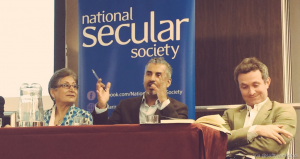By Ghalia Edrees
At a time when the concept of secularism is viewed as a threat in the Middle East and anti-Muslim sentiment is high in the West, I have tried to keep an open mind on the issue of religion. The recent butchery of Muslims by violent Islamists and repressive authorities has, however, forced me to make a choice.
I was born in England in 1981 but lived in Saudi Arabia until the age of 25. In 2014 I moved to London to claim my UK nationality. I went against the norm of Saudi women and lived alone without a guardian (mahram). After thirty years in Saudi Arabia, I could no longer accept the authority of Sharia law. As there is no opportunity to protest Sharia law, my only option was self-exile. Today I write this article from my apartment in Chelsea with my dog brushing against my feet.
On September 3rd, 2016, the National Secular Society organised a conference in London. As secularism is a topic that is hardly vocalised in the Saudi media, I made sure to attend and learn how it is approached publicly in the West.
I listened attentively with an open mind full of hope and optimism, sipping on a cold cup of coffee. My brain was drifting towards the defense line wondering, is this really the right battle? Is religion the basis of all wars and conflicts or is power the basis of all wars and conflicts? Why do I still find Douglas Murray’s humour so amusing? And why am I still sipping this very distasteful coffee?
When it was time for the Q&A session I raised my hand, hoping I was not being surveilled by Saudi authorities. I grabbed the microphone and stuttered, more so to make a point than to ask a question:
Countries that are governed by Sharia law, are not only governed by religion, they are also governed by tribal law, traditions, political interests and economic interests. Should Islam be removed from the equation (separating state from religion), there are no guarantees of stability, peace and freedom, given the other ruling factors will still serve the same political agenda.
As well as injustice, violence and oppression in the name of religion, there is injustice occurring in the name of secularism today. The discrimination against hijab-wearing Muslims in France has been the topic of discussion and disappointment in the press lately. However, one could argue that the laws of a secular country are prone to adjustments, debate and reform, whilst theocratic religious ruling rejects reform and leniency.
If the objective is world peace, then the means to ending this turmoil should not be fixated on attacking religion, but rather highlighting how it is exploited and politicised and accepting reform for the greater good.
Secularism is a political viewpoint which separates religion from politics. Islam is my faith and it is personal. When Islam, the religion, is used as a tool by rulers to control the concept of state, it is moulded into an imposed form of man-made law and everything attached to its history is manipulated and exploited to serve the law.
Countries like Saudi Arabia, Iran and Afghanistan still view secularism as a Western conspiracy theory to undermine and consume Islam. However, secularism is not against Islam, it is against exploiting Islam for political purposes.
“There is no teaching in the Qur’an on how to form an Islamic State after the death of the Prophet [Muhammad]. In fact, the word state has not been mentioned in the Qur’an once,” said Maajid Nawaz from the think tank Quilliam Foundation at the conference.
Islamic scholar Ali Abdel Raziq, basing his views on the culture of ijtihad (independent inquiry) and tajdid (renewal), said: “Islam has allowed us absolute freedom to organise the state in accordance with the intellectual, social and economic conditions in which we are found, taking into consideration social development and the requirement of the times.”
The message from Allah to the Prophet Muhammad in Surat Al-Imran, “Consult them in their affairs,” commands the Prophet to address the collective problems of the people through consultation.
The scholar Abdullahi Ahmed An-Na’im argues in his book, ‘The Future of Sharia: Islam and the Secular State’, that secularism promotes voluntary compliance with Sharia and allows religious piety out of honest conviction (niah) as opposed to hypocrisy (nifaq). He also believes that this would enhance genuine religious observances and nurture the role of Islam in the public life.
I, therefore, call for secularism because:
- 45% of reported abuse cases in Saudi Arabia are of women by their men who mostly get away with it in the name of religious law; because free thinkers are lashed publicly and sentenced to decades in Saudi prison for peaceful expression, and because some of the best literary resources are banned in Saudi Arabia, and education is limited to an imposed academic system that is incompatible with the modern time;
- I, as well as so many other Saudi women, am not allowed to travel without a granted signature from a male guardian, and because my non-Muslim friends are discriminated against and judged by conservative society;
- Orphans in my country are not allowed to be adopted by families in the name of religion, and because 14 million women in my country are forced into wearing black attire covering their figures in the name of honour and religion.
I call for justice, human rights and women’s rights and I stand against exploiting religion for power because the Quran says:
“O you who believe! Stand out firmly for justice, as witnesses to Allah, even if it be against yourselves, your parents, and your relatives, or whether it is against the rich or the poor…” (Quran 4:135)
Individuals must unite for a greater cause that is within our instinctual nature as humans to coexist on this earth. The law must serve humanity first and foremost, and accept the diversity of people’s faith’s and beliefs.
 Ghalia Edrees is a British-Saudi designer. She is the founder of ALGHALIA INTERIORS, an interior design practice and a contemporary Islamic furniture brand.
Ghalia Edrees is a British-Saudi designer. She is the founder of ALGHALIA INTERIORS, an interior design practice and a contemporary Islamic furniture brand.
Ghalia is a promoter of progressive thinking and an advocate of freedom who is deeply passionate about human rights and women’s rights. Follow her on Twitter. View her website here.



Dear Ghalia
Your reply to Mark is disconnected. There is a huge difference between pushing aside religion and orthodoxies. Orthodox mindset is against the idea of secularism .
Regards
Thanks for understanding that bit !
Dear Mark,
Thank you for reading my article and for your remarks.
I understand your frustration. You are absolutely entitled to your own feelings about Islam, but to say that Islam needs to be pushed aside as well as all religions, is not conducive, especially in these times. We need to acknowledge a problem and discuss it in order to solve it. I’m all for challenging ideas, but most of the arguments around this topic are tackled by mocking the religion itself, saying that its “bad”. In my opinion, this approach is ineffective. It is not rational to tell 1.6 billion Muslims “drop your faith and we will have peace’. This article is meant to make people distinguish between Islam the religion and Islam the political tool and I call for reform on that basis. In order to be persuasive, you need to be heard first and in order to be heard you need to speak the language of those you are trying to persuade.
I feel you haven’t read what I said (unless you feel religion=orthodox only)
My last comment of “pushing aside” was aimed at the orthodoxy which ruins everything. The Jewish orthodoxy stepped aside while most Jews became secular, whether they held onto traditions or not. It didn’t mean they lose their “religion”. I know enough Jewish people to know that.
And as I said, if a very popular imam considers secularism “evil” what chance does anyone have if the likes of him hold sway?
“The law must serve humanity first and foremost”
I understand the sentiment (as a secularist), but it seems to me that this is what the most fervent Sharia supporter would say, as well as the most fervent Secularism supporter would also say, in defence of their “systems”. So at that point, they are still arguing and think they both have the best way.
“……and accept the diversity of people’s faith’s and beliefs.”
This is the crux, which gives the secularists the upper hand. To me, even before I was aware of the word “secularism”, it was obvious to me (living in the UK, London), that there were loads of religions and apart from mad street preachers now and again, or people trying to get “Life of Brian” banned, we had nothing to worry about. They all had their council-tax-free (as I understand it) buildings of worship, and everything was fine. So in that respect, secularism is the best option for all.
Many Islamic clerics/imams/preachers etc will claim that Islam also allows for the same system, and will argue that over and again.
But the secularists have countries like Iran, or Saudi to point at, where no such thing takes place. There is also the tricky thing in the Quran regarding the Jizya tax on Christians and Jews, as well as a total dislike of disbelievers, polytheists and idol worshippers.
So with that, it allows a valid criticism and challenge of Islam. That might be construed as “attack” I suppose, but the questioning is valid.
The imams etc will always say that Iran and Saudi are “not doing it right” or some such thing. But the same imams will be against secularism in their own country (UK for example), because the law doesn’t allow full Sharia. A popular imam (TV/Radio) has called secularism “evil”, yet conversely declares that the UK is the best country to practice Islam. Work that one out, because it is simply the secular society that gives him that freedom.
So then all that is left (in front of me at least), is how people deal with this, and whether they can reject the conservatism and the orthodox imams who demand so much, and thereby change things, even with the criticism of Islam going on, which may also annoy.
As a side point, I also note that many Christian, if not Jewish commentators seem to have a downer on secularism. Again, I can’t imagine why, because of the total freedom they have.
Overall, I get back to that earlier thought from my younger days regarding not worrying about religions and “acceptance”, but right now, my acceptance doesn’t stretch to the Islamic orthodoxy which needs to be pushed aside, like other orthodoxies.